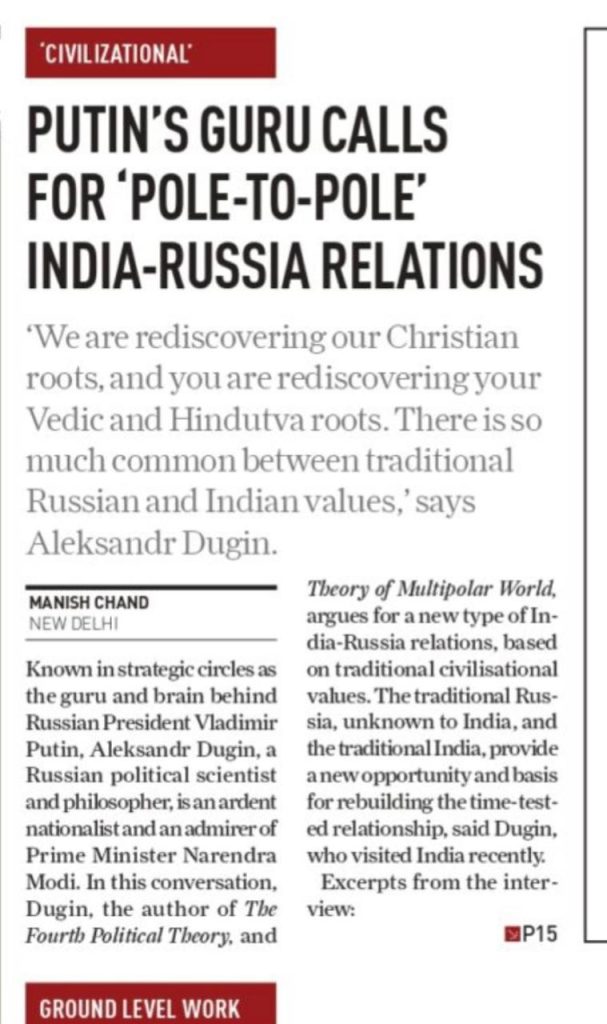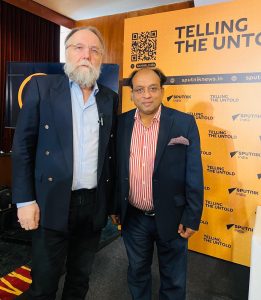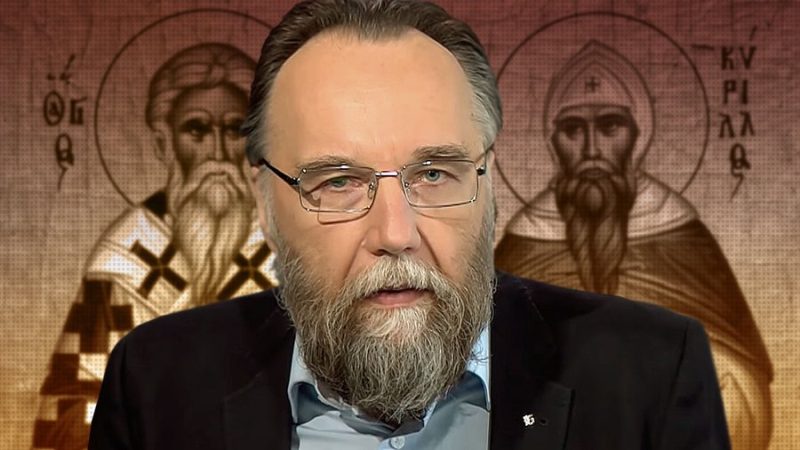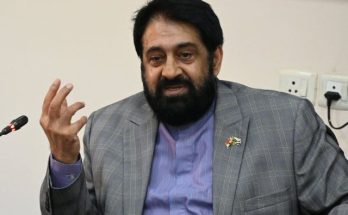Known in strategic circles as the guru and brain behind Russian President Vladimir Putin, Aleksandr Dugin, a controversial Russian political scientist and philosopher, is an ardent nationalist and an admirer of Prime Minister Narendra Modi. In this conversation with Manish Chand, CEO, Centre for Global India Insights and Editor-in-Chief, India Writes Network, Dugin, the author of The Fourth Political Theory, and Theory of Multipolar World, argues for a new type of India-Russia relations, based on traditional civilisational values. The traditional Russia, unknown to India, and the traditional India, provide a new opportunity and basis for rebuilding the time-tested relationship, said Dugin, who visited India recently.
(Excerpts from the interview)
Q) You have written about a new type of relationship between India and Russia, based on civilisational states. How can India and Russia rebuild their time-tested partnership on the basis of civilisational values?
A) In history, traditionally, good relations between Russia and India were based on the concept of progress. Russia was the Soviet Union, and Russia thought that socialism represented the future for humanity — it was anti-capitalism and anti-western. Somehow, India, led mostly by left political parties like the Congress Party, shared this progressivist attitude. So, everybody was united, everybody was thinking beyond capitalism, but still within the main western narrative.
There were two variations or deviations from the liberal capitalist narrative of the West: the Russian Soviet socialist model and an independent Indian model. But all these groups, countries that didn’t join either the communist or capitalist blocs, shared this linear progressist vision. That was the common basis for mutual understanding between the Soviet Union and post-colonial India, as well as post-colonial India with the liberal West.
Now, the paradigm has drastically changed. We haven’t fully understood this yet. There is no more universal concept of progress or universal technological development, imitating the western example or history. We now see the western narrative as a hegemonic colonial, racist, ethnocentric narrative. Once we become conscious of this, we need to rearrange all previous relations and axes.
Q) What’s your view of Prime Minister Modi?
A) Under PM Modi’s leadership, India has become a major force in global affairs. India is returning to its eternal traditional principles. This is an India unknown to Russia — India proud of its Vedic roots, karma, and completely different concepts from western political and social theories. Meanwhile, Russia is returning to its Christian Orthodox values: the church, Christ, the Orthodox worldview, and the sacredness of the empire.
This pre-modern or non-modern worldview has already been adopted by the Russian government as a cornerstone of our politics favouring traditional values. Something similar is happening in Modi’s India. Now, there are two distinct entities. This traditional Russia, unknown to India, and the traditional India, provide a new opportunity and basis for rebuilding the relationship.
Q) Are you suggesting that a return to Hindu roots in India provides a new basis for re-energizing and restructuring India-Russia relations?
A) I think we need a new shape, a new paradigm, for groups of people who will promote this dialogue. They should not be progressives. They should be traditionalists. This is a totally new situation where traditionalist Russia should find a special team of diplomats, scholars, and experts to engage with a completely new team of Indian experts. This is a challenge for us. We have had very good relations in the past, but we can no longer count on inertia. The inertia is dangerous. You are relying on yourself; we are relying on ourselves. We are rediscovering our Christian roots, and you are rediscovering your Vedic and Hindutva roots. There is so much common between traditional Russian and Indian values.
When I say pole-to-pole relations, I mean not country-to-country or international cooperation in the conventional sense, but tradition-to-tradition. This is the new type of relationship India and Russia should build. This will require a dialogue between Indian traditionalists and Russian traditionalists, not bureaucrats.
Q) How can Russia and India collaborate to shape a multipolar world?

A) I’ve written two books, Theory of Multipolar World and Multipolar World Order. One was written 14 years ago, and the other very recently. In these books, I explain that we are dealing with a completely new type of international relations theory. We can’t reduce multipolarity to realism, liberalism, Marxism, the English school, or any post-positivist international relations theories. So, we need a new theory, and I have proposed it. Interestingly, this theory is anti-racist and anti-fascist.
Critics claim we promote a nationalist agenda, but it’s the opposite. We advocate multipolar fairness, justice, and the real democratization of international relations within the framework of a totally new theory. This theory has been adopted as the main strategy for Russia’s Ministry of Foreign Affairs. It’s officially supported, so it’s not just an individual opinion. BRICS (Brazil, Russia, India, China, South Africa) represents genuine multipolarity and is an example of the new world order, where power is shared among multiple nations instead of being controlled by one dominant country.
Q) You are often referred to as “Putin’s brain,” the intellectual mentor to President Putin. Does Mr. Putin support this idea of pole-to-pole relations and civilizational values? Have you discussed it with him?
A) He supports this focus on civilizational values. It’s his idea.

(Manish Chand, is CEO, Centre for Global India Insights, a think tank focused on global affairs, and Editor, “India’s G20 Legacy: Shaping a New World Order,” a compendium of essays on India’s G20 presidency).
(This interview was published in The Sunday Guardian, a leading Indian newspaper)
Author Profile
- India Writes Network (www.indiawrites.org) is an emerging think tank and a media-publishing company focused on international affairs & the India Story. Centre for Global India Insights is the research arm of India Writes Network. To subscribe to India and the World, write to editor@indiawrites.org. A venture of TGII Media Private Limited, a leading media, publishing and consultancy company, IWN has carved a niche for balanced and exhaustive reporting and analysis of international affairs. Eminent personalities, politicians, diplomats, authors, strategy gurus and news-makers have contributed to India Writes Network, as also “India and the World,” a magazine focused on global affairs.
Latest entries
 DiplomacyJanuary 5, 2026India walks diplomatic tightrope over US operation in Venezuela
DiplomacyJanuary 5, 2026India walks diplomatic tightrope over US operation in Venezuela India and the WorldNovember 26, 2025G20@20: Africa’s Moment – The Once and Future World Order
India and the WorldNovember 26, 2025G20@20: Africa’s Moment – The Once and Future World Order DiplomacyOctober 4, 2025UNGA Resolution 2758 Must Not Be Distorted, One-China Principle Brooks No Challenge
DiplomacyOctober 4, 2025UNGA Resolution 2758 Must Not Be Distorted, One-China Principle Brooks No Challenge India and the WorldJuly 26, 2025MPs, diplomats laud Operation Sindoor, call for national unity to combat Pakistan-sponsored terror
India and the WorldJuly 26, 2025MPs, diplomats laud Operation Sindoor, call for national unity to combat Pakistan-sponsored terror








